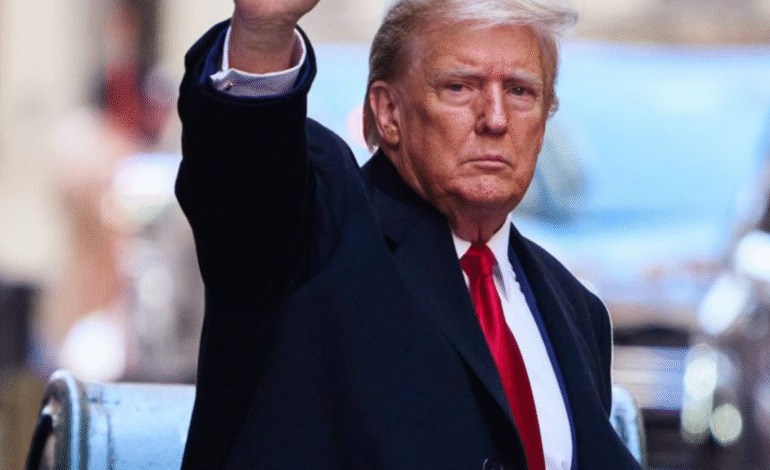Trump’s Strategic Gulf Visit Targets Diplomacy, Investment

Former U.S. President Donald Trump is set to embark on a strategic three-day visit to the Gulf next month, with stops in Saudi Arabia, the United Arab Emirates, and Qatar. Scheduled for mid-May 2025, this trip marks a significant moment in Trump’s renewed involvement in international diplomacy and economic affairs after returning to the political spotlight. The journey underscores the continued importance of the Gulf region in shaping the global political and financial order, and highlights Washington’s longstanding relationships with these energy-rich nations. The visit is expected to feature high-stakes meetings, significant investment deals, and multilayered discussions on regional security and cooperation.
Trump’s decision to prioritize this region so early in his international agenda demonstrates the weight he places on strategic alliances in the Middle East. The trip, which has already garnered international attention, is anticipated to recalibrate diplomatic dynamics between the United States and its Gulf partners, while potentially influencing broader developments in energy, trade, and defense.
US-Saudi Relations: A Historical Pillar Revisited
Saudi Arabia has long served as a cornerstone of American diplomacy in the Middle East. During his first term, Donald Trump made Riyadh the destination of his first foreign trip as President, signaling the kingdom’s crucial role in the U.S. geopolitical strategy. This upcoming visit revives that symbolic gesture, once again reinforcing bilateral trust and cooperation.
Trump is expected to meet with Crown Prince Mohammed bin Salman to revisit past economic and defense agreements. Discussions are likely to center around expanding military collaborations, especially in missile defense systems and joint counterterrorism efforts. Given the region’s turbulent political landscape, both nations will likely address issues related to Yemen, Iran, and energy stabilization.
US interests in Saudi Arabia remain deeply rooted in oil trade, arms sales, and regional intelligence collaboration. With the kingdom undergoing massive economic reforms under its Vision 2030 plan, American companies may seek renewed entry points into investment opportunities across sectors such as tech, infrastructure, and healthcare.
UAE: High Technology, Investment Deals, and Strategic Growth
Trump’s second stop in the Gulf will be the United Arab Emirates, a nation that has emerged as one of the fastest-growing global hubs for innovation, finance, and luxury real estate. Relations between the US and the UAE have remained strong over the years, defined by shared goals in security and trade.
Recent reports suggest that a key agenda item in Abu Dhabi will be a potential long-term investment deal between Emirati sovereign funds and major U.S. industries. These talks may cover sectors such as renewable energy, artificial intelligence, and space technology—areas where the UAE has accelerated its global ambitions.
Trump’s visit is also likely to reinforce American support for the UAE’s participation in regional peace-building efforts. The UAE was the first Gulf country to normalize relations with Israel under the Abraham Accords, which Trump’s administration helped broker. As diplomatic realignments continue across the region, Abu Dhabi could play a pivotal role in future negotiations involving Palestine, Iran, and beyond.
Qatar: Energy Partnership and Diplomatic Realignment
Trump’s final stop will be Qatar, home to one of the largest American military bases in the Middle East and a key player in global liquefied natural gas (LNG) markets. Relations between Doha and Washington have sometimes been strained by geopolitical rifts, but energy cooperation and shared security priorities have kept the alliance resilient.
The visit to Qatar may focus heavily on expanding U.S.-Qatari energy collaborations. With rising global energy demands and climate-driven shifts in supply strategies, both nations are likely to explore LNG trade, hydrogen development, and carbon capture technologies.
Additionally, diplomatic discussions are expected to include Qatar’s role as a mediator in regional conflicts. Whether it’s aiding ceasefire talks in Gaza or facilitating humanitarian aid channels into war-torn zones, Qatar’s neutral diplomacy remains valuable to U.S. foreign policy objectives. Trump’s administration historically had complex relations with Qatar during the 2017 Gulf diplomatic crisis, making this visit an important opportunity to rebuild confidence.
Trade and Infrastructure Development as Central Themes
One of the biggest talking points during Trump’s Gulf tour will be trade and infrastructure. American corporations are eyeing the Gulf’s ambitious development projects, ranging from futuristic smart cities in Saudi Arabia to AI-driven logistics hubs in the UAE.
Trump, who has long championed economic diplomacy, is expected to push for deals that bring Gulf capital into American infrastructure initiatives, including highways, airports, and advanced manufacturing plants. Simultaneously, Gulf nations may open doors for increased U.S. corporate participation in local development plans. Talks will likely address mutual investment vehicles, tax-friendly zones, and fintech innovations.
These partnerships reflect a shared understanding: while the U.S. brings technological know-how, the Gulf offers capital liquidity and appetite for bold projects. Strengthening these synergies could lead to multi-billion-dollar agreements benefiting both sides of the global economy.
Defense, Arms Sales, and Security Coordination
Defense is another major item on the agenda. The U.S. remains the largest supplier of arms to the Gulf, and Trump’s administration was known for signing record-breaking arms deals with Saudi Arabia and others. This visit is expected to revive talks around aircraft, missile defense systems, cybersecurity, and training programs.
Each of the three Gulf nations plays a different role in regional security architecture, and the U.S. sees continued military cooperation as key to maintaining balance against threats from Iran, extremist groups, and transnational smuggling networks.
There is also speculation that the visit will include discussions on renewing or updating existing defense pacts. This would not only reaffirm American presence in the region but also reflect a commitment to collaborative security planning, intelligence sharing, and readiness for crisis response.
Abraham Accords and Expanding Regional Normalization
A major legacy of Trump’s first administration was the successful brokering of the Abraham Accords, which saw UAE and Bahrain normalize diplomatic ties with Israel. Now, with growing momentum behind broader normalization across the Arab world, Trump is expected to revisit this topic with regional leaders.
His meetings could involve proposals for renewed dialogue between Israel and Saudi Arabia, or strategies for easing tensions in Gaza and Lebanon. The Gulf nations, particularly the UAE and Qatar, could serve as facilitators of such conversations. Trump is likely to position these efforts as part of a broader vision for Middle East peace and economic integration.
The potential expansion of the Abraham Accords remains politically complex, with competing narratives and sensitive negotiations in play. However, any forward movement could mark a historic turning point in regional diplomacy.
The Optics and Political Significance of the Visit
Trump’s Gulf trip also holds deep political symbolism, both domestically and internationally. For the U.S., it signals a return to active global leadership and a reboot of Trump’s foreign policy agenda. Domestically, it could energize supporters who see Trump as a dealmaker and global statesman.
For Gulf nations, the visit sends a message of continuity and trust in the longstanding partnership with Washington. It may also enhance each country’s regional clout, especially if investment announcements or defense collaborations emerge from the high-profile meetings.
With global media closely watching, the success of the visit will likely be judged not only by signed agreements but also by the diplomatic tone set during each stop. Trump’s ability to navigate complex alliances and secure tangible outcomes will be key to the trip’s perceived impact.







